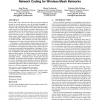Free Online Productivity Tools
i2Speak
i2Symbol
i2OCR
iTex2Img
iWeb2Print
iWeb2Shot
i2Type
iPdf2Split
iPdf2Merge
i2Bopomofo
i2Arabic
i2Style
i2Image
i2PDF
iLatex2Rtf
Sci2ools
WISEC
2009
ACM
2009
ACM
Practical defenses against pollution attacks in intra-flow network coding for wireless mesh networks
Recent studies show that network coding can provide significant benefits to network protocols, such as increased throughput, reduced network congestion, higher reliability, and lower power consumption. The core principle of network coding is that intermediate nodes actively mix input packets to produce output packets. This mixing subjects network coding systems to a severe security threat, known as a pollution attack, where attacker nodes inject corrupted packets into the network. Corrupted packets propagate in an epidemic manner, depleting network resources and significantly decreasing throughput. Pollution attacks are particularly dangerous in wireless networks, where attackers can easily inject packets or compromise devices due to the increased network vulnerability. In this paper, we address pollution attacks against network coding systems in wireless mesh networks. We demonstrate that previous solutions to the problem are impractical in wireless networks, incurring an unaccept...
| Added | 19 May 2010 |
| Updated | 19 May 2010 |
| Type | Conference |
| Year | 2009 |
| Where | WISEC |
| Authors | Jing Dong, Reza Curtmola, Cristina Nita-Rotaru |
Comments (0)

